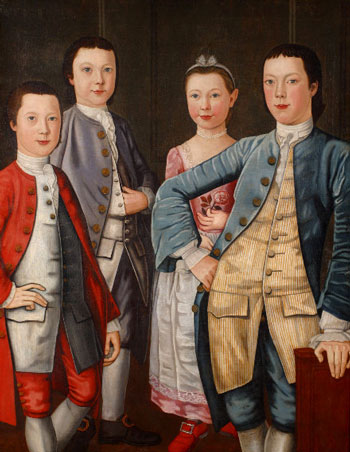Mind Your Manners!

The Rapalje Children. John Durand, 1768.
During the 1700s, books of manners were published that included etiquette rules (rules of good conduct). Good manners were important because they not only reflected a person’s education and intellect, but also the family’s social status. Read through some of the following rules. Do you have similar rules in your house?
Come not to the Table without having your Hands and Face washed, and your Head combed.
Sit not down until thou art bidden by thy Parents or other Superiors.
Be sure thou never sittest down until a Blessing be desired, and then in thy due Place.
Ask not for any Thing, but tarry until it be offered thee.
Find no fault with any Thing that is given you.
Speak not at the Table; if thy Superiors be discoursing, meddle not with the Matter; but be silent, except thou are spoken unto.
Eat not too fast or with greedy behavior.
Eat not too much, but moderately.
Eat not so slow as to make others wait for thee.
Make not a Noise with thy Tongue, Mouth, Lips or Breath, in eating or drinking.
Lean not thy Elbow on the Table, or on the Back of the Chair.
Blow not thy Meat, but with Patience wait until it be cool.
Throw not any Thing under the Table.
Frown not nor murmur if there be any Thing at the Table which thy Parents, or Strangers with them, eat of, while thou thyself hast none given to thee.
3
Around the age of 16, George Washington wrote 110 rules that one must follow to be an upstanding citizen. They included rules such as:
1st Every Action done in Company, ought to be with Some Sign of Respect, to those that are Present.
2d When in Company, put not your Hands to any Part of the Body, not usualy Discovered.
91st Make no Shew of taking great Delight in your Victuals, Feed not with Greediness; cut your Bread with a Knife, lean not on the Table neither find fault with what you Eat.
94th If you Soak bread in the Sauce let it be no more than what you put in your Mouth at a time and blow not your broth at Table but Stay till Cools of it Self.
96th It's unbecoming to Stoop much to ones Meat Keep your Fingers clean & when foul wipe them on a Corner of your Table Napkin.
97th Put not another bit into your Mouth til the former be Swallowed let not your Morsels be too big for the Gowls.
98th Drink not nor talk with your mouth full neither Gaze about you while you are a Drinking.
99th Drink not too leisurely nor yet too hastily. Before and after Drinking wipe your Lips breath not then or Ever with too Great a Noise, for its uncivil.
100th Cleanse not your teeth with the Table Cloth Napkin Fork or Knife but if Others do it let it be done wt. a Pick Tooth.
101st Rince not your Mouth in the Presence of Others.
4
- A Pretty Little Pocket Book (Worcester, Massachusetts: Isaiah Thomas, 1787).
- George Washington, Rules of Civility & Decent Behaviour in Company and Conversation: a Book of Etiquette (Williamsburg, VA: Beaver Press, 1971).


